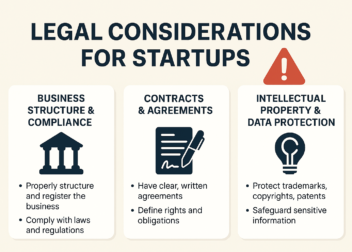A simple guide to International contracts for Canadian startups
Starting a business in Canada is tough. Landing your first international client feels like a huge win. But that excitement can vanish fast if the contract you sign creates more problems than it solves. Let’s start with a real-world story about a client of ours. It’s a perfect example of what can go wrong. The Three-Country ‘Mix-Up‘ of a StartUp An Ontario tech startup, let’s call them “TechCo,” was thrilled to sign a deal with a big German client. Here was the setup: To keep things “simple,” the contract said the German client should pay the Indian company directly. But the contract was missing some very important details. It didn’t say which country’s courts would handle disputes, and it was silent on taxes. When a disagreement popped up, TechCo was in a world of trouble: This story shows why getting the contract right is so important. Here’s what you need to watch out for. 1. Decide Who Has “Home Field Advantage” (Jurisdiction) Every cross-border contract needs two crucial clauses right at the start: Governing Law and Jurisdiction. Why it matters: If you don’t set these rules in the contract, you could spend a fortune just figuring out where to even start a legal fight. 2. Protect Your Big Ideas (Intellectual Property) For most startups, your ideas and inventions are your most valuable assets. Your contract must protect them. Why it matters: Without clear IP protection, a foreign partner or competitor could legally copy your idea and sell it in their market, and you wouldn’t be able to do a thing about it. 3. Be Careful with People’s Information (Data Privacy) If you handle any personal information from customers or clients, you have to follow privacy laws. This gets tricky with international deals. Why it matters: A data breach on an international project can get you in trouble with the law in more than one country, costing you a lot of money and ruining your reputation. 4. Have a Plan for Disagreements (Dispute Resolution) Even with a great contract, you might still have disagreements. Instead of going straight to a long and expensive court battle, plan for a better way. Why it matters: A simple dispute resolution plan can save your business relationship and prevent a disagreement from turning into a costly legal war. 5. Get the Money Details Right (Payments and Taxes) Fuzzy details about money can sink your company. This area is full of traps, especially when dealing with the Canada Revenue Agency (CRA). Here’s how to protect yourself: The Bottom Line Doing business internationally is a fantastic way for a Canadian startup to grow. But it comes with risks. A clear, simple, and smart contract is your best line of defense. Before you sign any international deal, it’s wise to get advice from a legal expert who understands these challenges. At Ahlawat Law PC, we help Canadian startups like yours navigate the world of cross-border business safely. Don’t risk your hard work. Let’s talk before you sign.





